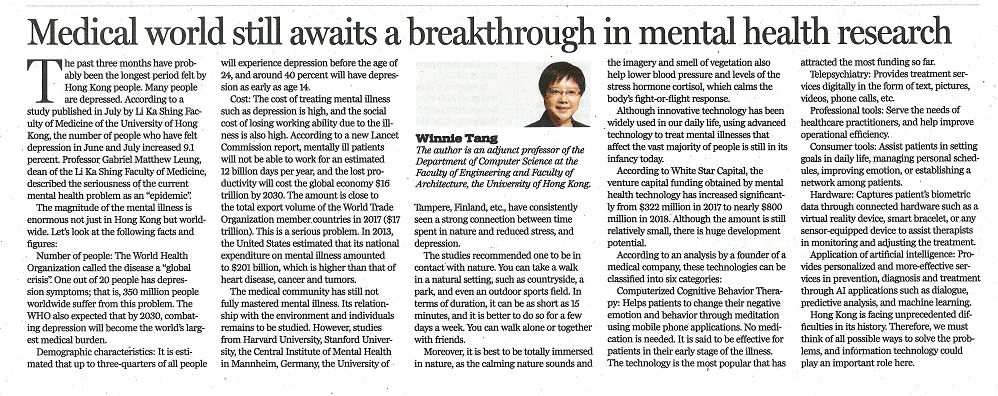網上版請按此

Medical world still awaits a breakthrough in mental health research
The past three months have probably been the longest period felt by Hong Kong people. Many people are depressed. According to a study published in July by Li Ka Shing Faculty of Medicine of the University of Hong Kong, the number of people who have felt depression in June and July increased 9.1 percent. Professor Gabriel Matthew Leung, dean of the Li Ka Shing Faculty of Medicine, described the seriousness of the current mental health problem as an "epidemic".
The magnitude of the mental illness is enormous not just in Hong Kong but worldwide. Let's look at the following facts and figures:
Number of people: The World Health Organization called the disease a "global crisis". One out of 20 people has depression symptoms; that is, 350 million people worldwide su er from this problem. The WHO also expected that by 2030, combating depression will become the world's largest medical burden.
Demographic characteristics: It is estimated that up to three-quarters of all people will experience depression before the age of 24, and around 40 percent will have depression as early as age 14.
Cost: The cost of treating mental illness such as depression is high, and the social cost of losing working ability due to the illness is also high. According to a new Lancet Commission report, mentally ill patients will not be able to work for an estimated 12 billion days per year, and the lost productivity will cost the global economy $16 trillion by 2030. The amount is close to the total export volume of the World Trade Organization member countries in 2017 ($17 trillion). This is a serious problem. In 2013, the United States estimated that its national expenditure on mental illness amounted to $201 billion, which is higher than that of heart disease, cancer and tumors.
The medical community has still not fully mastered mental illness. Its relationship with the environment and individuals remains to be studied. However, studies from Harvard University, Stanford University, the Central Institute of Mental Health in Mannheim, Germany, the University of Tampere, Finland, etc., have consistently seen a strong connection between time spent in nature and reduced stress, and depression.
The studies recommended one to be in contact with nature. You can take a walk in a natural setting, such as countryside, a park, and even an outdoor sports field. In terms of duration, it can be as short as 15 minutes, and it is better to do so for a few days a week. You can walk alone or together with friends.
Moreover, it is best to be totally immersed in nature, as the calming nature sounds and the imagery and smell of vegetation also help lower blood pressure and levels of the stress hormone cortisol, which calms the body's fight-or-flight response.
Although innovative technology has been widely used in our daily life, using advanced technology to treat mental illnesses that affect the vast majority of people is still in its infancy today.
According to White Star Capital, the venture capital funding obtained by mental health technology has increased significantly from $322 million in 2017 to nearly $800 million in 2018. Although the amount is still relatively small, there is huge development potential.
According to an analysis by a founder of a medical company, these technologies can be classified into six categories:
Computerized Cognitive Behavior Therapy: Helps patients to change their negative emotion and behavior through meditation using mobile phone applications. No medication is needed. It is said to be effective for patients in their early stage of the illness.The technology is the most popular that has attracted the most funding so far.
Telepsychiatry: Provides treatment services digitally in the form of text, pictures, videos, phone calls, etc.
Professional tools: Serve the needs of healthcare practitioners, and help improve operational efficiency.
Consumer tools: Assist patients in setting goals in daily life, managing personal schedules, improving emotion, or establishing a network among patients.
Hardware: Captures patient's biometric data through connected hardware such as a virtual reality device, smart bracelet, or any sensor-equipped device to assist therapists in monitoring and adjusting the treatment.
Application of artificial intelligence: Provides personalized and more-effctive services in prevention, diagnosis and treatment through AI applications such as dialogue, predictive analysis, and machine learning.
Hong Kong is facing unprecedented difficulties in its history. Therefore, we must think of all possible ways to solve the problems, and information technology could play an important role here.
Dr. Winnie Tang
Adjunct Professor, Department of Computer Science, Faculty of Engineering and Faculty of Architecture, The University of Hong Kong